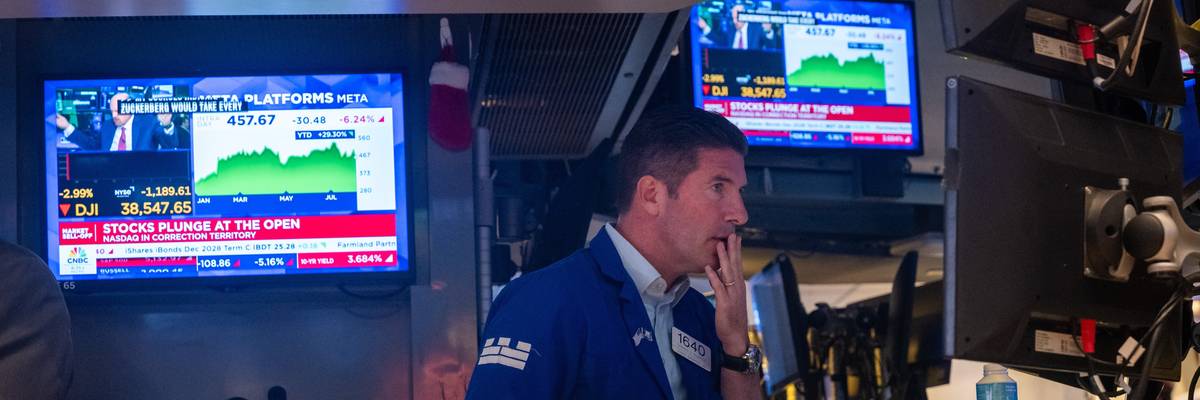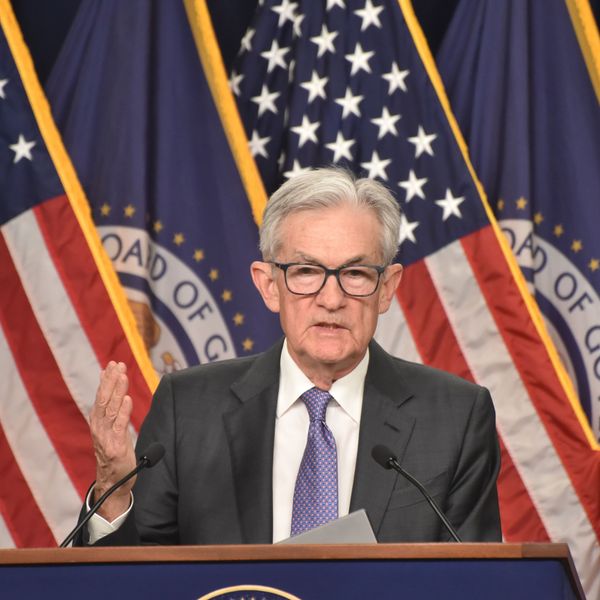
Fed Urged to Enact Emergency Rate Cut as Global Sell-Off Stokes Recession Fears
Economist Paul Krugman argued there is a "real case for an emergency cut soon" as concerns grow that the Fed has waited too long to act.
A steep global sell-off in financial markets on Monday and broader concerns about the health of the U.S. economy sparked calls for the Federal Reserve to take the rare step of enacting an emergency interest rate cut—something last done at the start of the coronavirus pandemic.
The calls came as the Fed and its chairman, Jerome Powell, faced mounting criticism for not reducing borrowing costs earlier despite slowing job and wage growth and overwhelming evidence that U.S. inflation has cooled dramatically from its 2022 peak.
Jeremy Siegel, an American economist and finance professor at the Wharton School of the University of Pennsylvania, said in an appearance on CNBC Monday morning that the Fed should "at minimum" implement an emergency 75-basis-point cut to interest rates followed by another cut of the same size at its scheduled September meeting.
The current federal funds rate—the target interest rate set by the Fed—is 5.25% to 5.50%. Siegel argued that the rate should be "somewhere between 3.5% and 4%," noting that inflation is nearly at the central bank's arbitrary 2% inflation target while the unemployment rate is rising.
"How much have we moved the fed funds rate? Zero," said Siegel. "That makes absolutely no sense whatsoever."
"I'm calling for a 75 basis point emergency cut in the Fed funds rate, with another 75 basis point cut indicated for next month at the September meeting - and that's minimum," says Wharton's Jeremy Siegel: pic.twitter.com/s4CgWx962Q
— Squawk Box (@SquawkCNBC) August 5, 2024
Economist Paul Krugman also urged the Fed to act with an emergency rate cut, rejecting the counterargument that doing so could suggest policymakers are panicking.
"Even though I've been arguing for rate cuts—50 [basis points] in September for sure—I wasn't calling for an inter-meeting cut, because that might signal panic," Krugman wrote on social media. "But since we may be seeing a panic anyway, that argument loses its force. Real case for an emergency cut soon."
Monday's sell-off wiped $1 trillion off the market values of leading U.S. tech companies shortly after trading began, and Wall Street's "fear index" jumped to its highest level since 2020.
"Is this 1987 all over again?" asked a headline in The Wall Street Journal, referring to the infamous stock market crash known as "Black Monday." Reuters proclaimed that global markets were giving off "'Black Monday' vibes." The Financial Times noted that "Tokyo's Topix fell 12.2%, the sharpest sell-off since 'Black Monday' in October 1987 and more than erasing its gains for the year."
"The biggest concern here is they put us in a recessionary environment, and it's too late to course-correct."
U.S. lawmakers, economists, and progressive advocacy groups have been urging the chair of the world's most powerful central bank to cut interest rates for months, warning that keeping borrowing costs elevated for an extended period could do profound harm to workers as well as the broader U.S. and global economy. Higher rates have already taken a significant toll on lower-income Americans, in part due to rising interest payments and sky-high housing costs.
"Chair Powell, enough brinkmanship," the Groundwork Collaborative, a vocal advocate of rate cuts, wrote on social media Monday. "It's time to follow the data demanding rate cuts. It's time to put the American people first. It's time to cut interest rates now."
During its meeting last week, the Federal Open Market Committee (FOMC)—the Fed's policy-setting committee—opted to keep rates at a two-decade high for the 12th consecutive month, sparking allegations that Powell is succumbing to political pressure from Republican presidential nominee Donald Trump and GOP lawmakers.
Powell said a rate cut is "on the table" for the September FOMC meeting but did not make any explicit commitments.
Two days after the Fed decided to keep the current federal funds rate in place—which came even as other nations' central banks moved to lower interest rates—the U.S. Labor Department released data showing that the country added far fewer jobs than expected in July and that the unemployment rate rose to its highest level in roughly three years.
The data amplified concerns that the Fed has waited too long to reduce borrowing costs.
"I worry that they are behind the eight ball here," Groundwork executive director Lindsay Owens said last week. "And with every passing FOMC meeting where they don't move to correct for being behind the eight ball, the risks accumulate and compound."
"The biggest concern here is they put us in a recessionary environment, and it's too late to course-correct," Owens added. "Much better to course-correct early than late, in my opinion."
An Urgent Message From Our Co-Founder
Dear Common Dreams reader, The U.S. is on a fast track to authoritarianism like nothing I've ever seen. Meanwhile, corporate news outlets are utterly capitulating to Trump, twisting their coverage to avoid drawing his ire while lining up to stuff cash in his pockets. That's why I believe that Common Dreams is doing the best and most consequential reporting that we've ever done. Our small but mighty team is a progressive reporting powerhouse, covering the news every day that the corporate media never will. Our mission has always been simple: To inform. To inspire. And to ignite change for the common good. Now here's the key piece that I want all our readers to understand: None of this would be possible without your financial support. That's not just some fundraising cliche. It's the absolute and literal truth. We don't accept corporate advertising and never will. We don't have a paywall because we don't think people should be blocked from critical news based on their ability to pay. Everything we do is funded by the donations of readers like you. Will you donate now to help power the nonprofit, independent reporting of Common Dreams? Thank you for being a vital member of our community. Together, we can keep independent journalism alive when it’s needed most. - Craig Brown, Co-founder |
A steep global sell-off in financial markets on Monday and broader concerns about the health of the U.S. economy sparked calls for the Federal Reserve to take the rare step of enacting an emergency interest rate cut—something last done at the start of the coronavirus pandemic.
The calls came as the Fed and its chairman, Jerome Powell, faced mounting criticism for not reducing borrowing costs earlier despite slowing job and wage growth and overwhelming evidence that U.S. inflation has cooled dramatically from its 2022 peak.
Jeremy Siegel, an American economist and finance professor at the Wharton School of the University of Pennsylvania, said in an appearance on CNBC Monday morning that the Fed should "at minimum" implement an emergency 75-basis-point cut to interest rates followed by another cut of the same size at its scheduled September meeting.
The current federal funds rate—the target interest rate set by the Fed—is 5.25% to 5.50%. Siegel argued that the rate should be "somewhere between 3.5% and 4%," noting that inflation is nearly at the central bank's arbitrary 2% inflation target while the unemployment rate is rising.
"How much have we moved the fed funds rate? Zero," said Siegel. "That makes absolutely no sense whatsoever."
"I'm calling for a 75 basis point emergency cut in the Fed funds rate, with another 75 basis point cut indicated for next month at the September meeting - and that's minimum," says Wharton's Jeremy Siegel: pic.twitter.com/s4CgWx962Q
— Squawk Box (@SquawkCNBC) August 5, 2024
Economist Paul Krugman also urged the Fed to act with an emergency rate cut, rejecting the counterargument that doing so could suggest policymakers are panicking.
"Even though I've been arguing for rate cuts—50 [basis points] in September for sure—I wasn't calling for an inter-meeting cut, because that might signal panic," Krugman wrote on social media. "But since we may be seeing a panic anyway, that argument loses its force. Real case for an emergency cut soon."
Monday's sell-off wiped $1 trillion off the market values of leading U.S. tech companies shortly after trading began, and Wall Street's "fear index" jumped to its highest level since 2020.
"Is this 1987 all over again?" asked a headline in The Wall Street Journal, referring to the infamous stock market crash known as "Black Monday." Reuters proclaimed that global markets were giving off "'Black Monday' vibes." The Financial Times noted that "Tokyo's Topix fell 12.2%, the sharpest sell-off since 'Black Monday' in October 1987 and more than erasing its gains for the year."
"The biggest concern here is they put us in a recessionary environment, and it's too late to course-correct."
U.S. lawmakers, economists, and progressive advocacy groups have been urging the chair of the world's most powerful central bank to cut interest rates for months, warning that keeping borrowing costs elevated for an extended period could do profound harm to workers as well as the broader U.S. and global economy. Higher rates have already taken a significant toll on lower-income Americans, in part due to rising interest payments and sky-high housing costs.
"Chair Powell, enough brinkmanship," the Groundwork Collaborative, a vocal advocate of rate cuts, wrote on social media Monday. "It's time to follow the data demanding rate cuts. It's time to put the American people first. It's time to cut interest rates now."
During its meeting last week, the Federal Open Market Committee (FOMC)—the Fed's policy-setting committee—opted to keep rates at a two-decade high for the 12th consecutive month, sparking allegations that Powell is succumbing to political pressure from Republican presidential nominee Donald Trump and GOP lawmakers.
Powell said a rate cut is "on the table" for the September FOMC meeting but did not make any explicit commitments.
Two days after the Fed decided to keep the current federal funds rate in place—which came even as other nations' central banks moved to lower interest rates—the U.S. Labor Department released data showing that the country added far fewer jobs than expected in July and that the unemployment rate rose to its highest level in roughly three years.
The data amplified concerns that the Fed has waited too long to reduce borrowing costs.
"I worry that they are behind the eight ball here," Groundwork executive director Lindsay Owens said last week. "And with every passing FOMC meeting where they don't move to correct for being behind the eight ball, the risks accumulate and compound."
"The biggest concern here is they put us in a recessionary environment, and it's too late to course-correct," Owens added. "Much better to course-correct early than late, in my opinion."
A steep global sell-off in financial markets on Monday and broader concerns about the health of the U.S. economy sparked calls for the Federal Reserve to take the rare step of enacting an emergency interest rate cut—something last done at the start of the coronavirus pandemic.
The calls came as the Fed and its chairman, Jerome Powell, faced mounting criticism for not reducing borrowing costs earlier despite slowing job and wage growth and overwhelming evidence that U.S. inflation has cooled dramatically from its 2022 peak.
Jeremy Siegel, an American economist and finance professor at the Wharton School of the University of Pennsylvania, said in an appearance on CNBC Monday morning that the Fed should "at minimum" implement an emergency 75-basis-point cut to interest rates followed by another cut of the same size at its scheduled September meeting.
The current federal funds rate—the target interest rate set by the Fed—is 5.25% to 5.50%. Siegel argued that the rate should be "somewhere between 3.5% and 4%," noting that inflation is nearly at the central bank's arbitrary 2% inflation target while the unemployment rate is rising.
"How much have we moved the fed funds rate? Zero," said Siegel. "That makes absolutely no sense whatsoever."
"I'm calling for a 75 basis point emergency cut in the Fed funds rate, with another 75 basis point cut indicated for next month at the September meeting - and that's minimum," says Wharton's Jeremy Siegel: pic.twitter.com/s4CgWx962Q
— Squawk Box (@SquawkCNBC) August 5, 2024
Economist Paul Krugman also urged the Fed to act with an emergency rate cut, rejecting the counterargument that doing so could suggest policymakers are panicking.
"Even though I've been arguing for rate cuts—50 [basis points] in September for sure—I wasn't calling for an inter-meeting cut, because that might signal panic," Krugman wrote on social media. "But since we may be seeing a panic anyway, that argument loses its force. Real case for an emergency cut soon."
Monday's sell-off wiped $1 trillion off the market values of leading U.S. tech companies shortly after trading began, and Wall Street's "fear index" jumped to its highest level since 2020.
"Is this 1987 all over again?" asked a headline in The Wall Street Journal, referring to the infamous stock market crash known as "Black Monday." Reuters proclaimed that global markets were giving off "'Black Monday' vibes." The Financial Times noted that "Tokyo's Topix fell 12.2%, the sharpest sell-off since 'Black Monday' in October 1987 and more than erasing its gains for the year."
"The biggest concern here is they put us in a recessionary environment, and it's too late to course-correct."
U.S. lawmakers, economists, and progressive advocacy groups have been urging the chair of the world's most powerful central bank to cut interest rates for months, warning that keeping borrowing costs elevated for an extended period could do profound harm to workers as well as the broader U.S. and global economy. Higher rates have already taken a significant toll on lower-income Americans, in part due to rising interest payments and sky-high housing costs.
"Chair Powell, enough brinkmanship," the Groundwork Collaborative, a vocal advocate of rate cuts, wrote on social media Monday. "It's time to follow the data demanding rate cuts. It's time to put the American people first. It's time to cut interest rates now."
During its meeting last week, the Federal Open Market Committee (FOMC)—the Fed's policy-setting committee—opted to keep rates at a two-decade high for the 12th consecutive month, sparking allegations that Powell is succumbing to political pressure from Republican presidential nominee Donald Trump and GOP lawmakers.
Powell said a rate cut is "on the table" for the September FOMC meeting but did not make any explicit commitments.
Two days after the Fed decided to keep the current federal funds rate in place—which came even as other nations' central banks moved to lower interest rates—the U.S. Labor Department released data showing that the country added far fewer jobs than expected in July and that the unemployment rate rose to its highest level in roughly three years.
The data amplified concerns that the Fed has waited too long to reduce borrowing costs.
"I worry that they are behind the eight ball here," Groundwork executive director Lindsay Owens said last week. "And with every passing FOMC meeting where they don't move to correct for being behind the eight ball, the risks accumulate and compound."
"The biggest concern here is they put us in a recessionary environment, and it's too late to course-correct," Owens added. "Much better to course-correct early than late, in my opinion."

